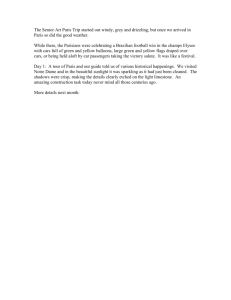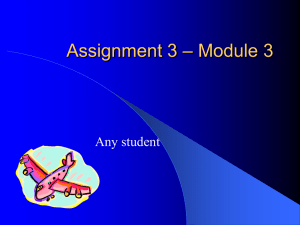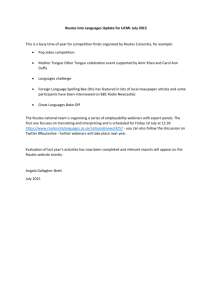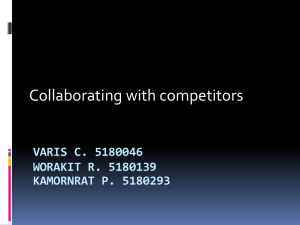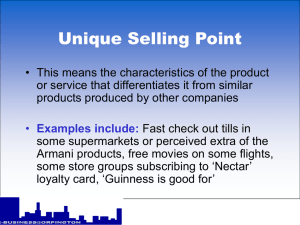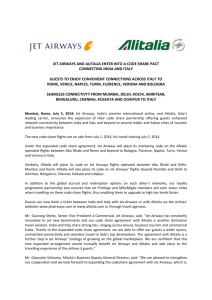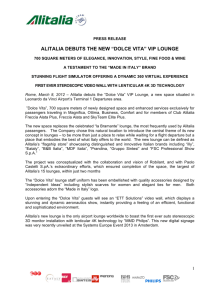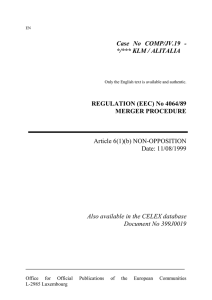DOC - Europa
advertisement
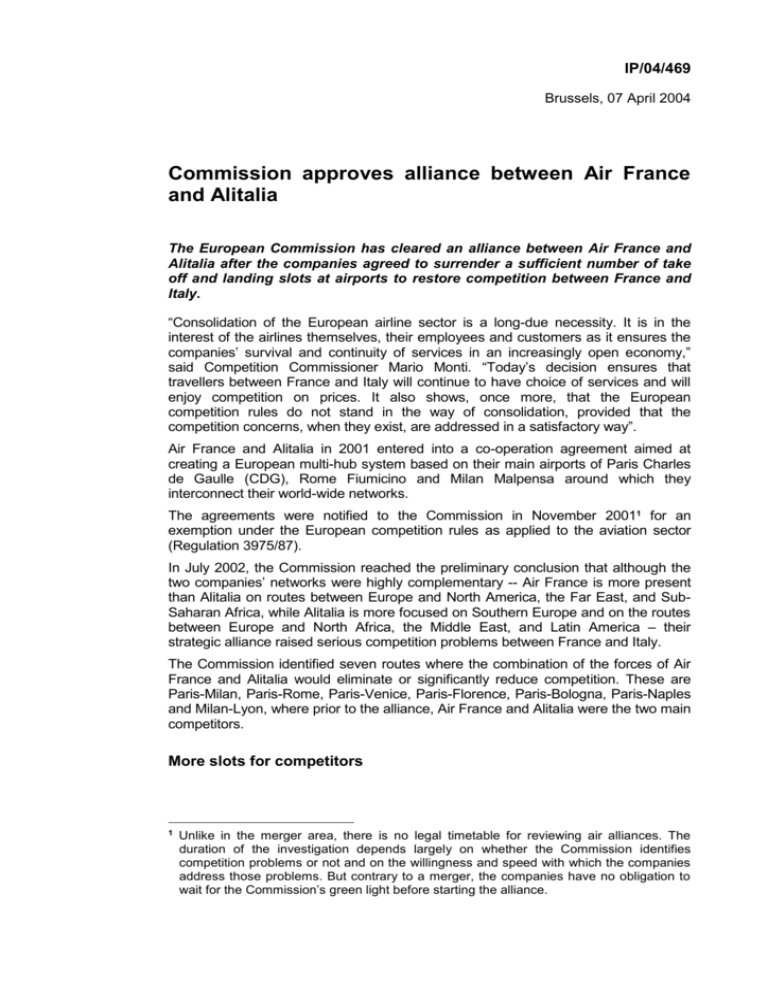
IP/04/469 Brussels, 07 April 2004 Commission approves alliance between Air France and Alitalia The European Commission has cleared an alliance between Air France and Alitalia after the companies agreed to surrender a sufficient number of take off and landing slots at airports to restore competition between France and Italy. “Consolidation of the European airline sector is a long-due necessity. It is in the interest of the airlines themselves, their employees and customers as it ensures the companies’ survival and continuity of services in an increasingly open economy,” said Competition Commissioner Mario Monti. “Today’s decision ensures that travellers between France and Italy will continue to have choice of services and will enjoy competition on prices. It also shows, once more, that the European competition rules do not stand in the way of consolidation, provided that the competition concerns, when they exist, are addressed in a satisfactory way”. Air France and Alitalia in 2001 entered into a co-operation agreement aimed at creating a European multi-hub system based on their main airports of Paris Charles de Gaulle (CDG), Rome Fiumicino and Milan Malpensa around which they interconnect their world-wide networks. The agreements were notified to the Commission in November 20011 for an exemption under the European competition rules as applied to the aviation sector (Regulation 3975/87). In July 2002, the Commission reached the preliminary conclusion that although the two companies’ networks were highly complementary -- Air France is more present than Alitalia on routes between Europe and North America, the Far East, and SubSaharan Africa, while Alitalia is more focused on Southern Europe and on the routes between Europe and North Africa, the Middle East, and Latin America – their strategic alliance raised serious competition problems between France and Italy. The Commission identified seven routes where the combination of the forces of Air France and Alitalia would eliminate or significantly reduce competition. These are Paris-Milan, Paris-Rome, Paris-Venice, Paris-Florence, Paris-Bologna, Paris-Naples and Milan-Lyon, where prior to the alliance, Air France and Alitalia were the two main competitors. More slots for competitors 1 Unlike in the merger area, there is no legal timetable for reviewing air alliances. The duration of the investigation depends largely on whether the Commission identifies competition problems or not and on the willingness and speed with which the companies address those problems. But contrary to a merger, the companies have no obligation to wait for the Commission’s green light before starting the alliance. After lengthy discussions, the two airlines have agreed to surrender up to 42 pairs of slots (i.e. 84 single take-off or landing slots) per day, of which 19 pairs at the Paris airports of CDG and Orly. This creates the conditions for a total of up to 21 return flights2 a day on the affected routes. The Commission seeks to safeguard the following number of competing services: - Up to six daily return flights between Paris and Milan in case the flights are operated by more than one competitor or up to five if one single competitor, - Up to five daily return flights between Paris and Rome. - Up to three daily return flights between Paris and Venice, - Up to two daily return flights on each of the following routes: Paris-Bologna, Paris-Florence and Lyon-Milan, - One daily return flight between Paris and Naples. In practice, however, the number of slots that the parties will need to surrender will be lower because a number of competitors have emerged on the Paris-Milan, ParisRome, Paris-Naples and Paris-Venice routes since the alliance was announced3. These competitors have entered the market because the routes concerned are attractive enough and slots became available as a result of events not directly linked to the alliance between Air France and Alitalia (bankruptcies of several airlines holding slots at Paris-Orly). The slots surrendered by Air France and Alitalia will enable, for instance on ParisRome, (i) either the competitor currently operating flights on this route to increase its services up to five daily return flights or (ii) another competitor to start new services so that, in total, 5 daily return flights are operated in competition with the alliance partners. The slots will be made available on a preferential basis to the competitor who will operate in total the highest number of frequencies on the route (including its existing services). In the event any of the actual competitors were to exit the market, Air France and Alitalia would need to make their own slots available to others rivals in order to restore the level of competition sought by this decision. As with other air alliances, the decision contains the necessary measures to ensure the new entrants a fair chance to establish themselves as credible competitor. Some of the measures will enhance the inter-changeability, from the customer point of view, between the flights operated by the two partners and the flights operated by competitors on the affected routes. In particular, the former will allow rivals to participate in their frequent flyer programmes, if they so wish. Another commitment allows passengers to fly with the Parties and return with a competitor or conversely on a given journey, based on a single ticket. The two partners are also required not to increase their offer of flights on the affected routes again to give competitors a fair chance to compete. 2 3 A return flight requires two pairs of slots: two at airport A (one for take off + one for landing) and two at airport B, which makes a total of four slots. Volare operates three daily return flights (DRF) between Paris and Milan Malpensa and Easyjet operates one daily return flight between Paris and Milan Linate; Volare also operates three DRF between Paris and Rome, two between Paris and Venice; and Meridiana has two DRF between Paris and Naples. 2 Finally, the alliance partners also committed to facilitate inter-modal passenger agreements in order to offer greater choice and better multi-modal transport services to consumers. This, for instance, would allow customers to combine a one way railway trip with a return flight at attractive conditions The Commission’s clearance was granted for a period of six years, starting from the date of notification, i.e. 12 November 2001. Background The alliance will give Alitalia customers access to more than 100 new destinations while Air France customers will be offered about 20 new routes. The agreements enable the two carriers to cooperate across their respective networks in terms of pricing, scheduling and capacity. The parties, amongst other things, agree on prices and share earnings on routes between France and Italy. The Commission looks favourably on the consolidation on the airline sector, but needs to ensure that this is not to the detriment of consumers. The number of international airline alliances and similar forms of co-operation agreements has significantly increased in the last 10 years. Examples of alliances to which the Commission granted a six-year antitrust immunity include Lufthansa/Austrian Airlines, British Airways/SN Brussels Airlines and BA/Iberia. In February 2004, the Commission also cleared, subject to conditions, the merger between Air France and KLM which will build the largest airline group in Europe4. The Commission is also still reviewing the impact on competition of the Skyteam alliance between Air France, Alitalia and Delta among others. 4 See Commission Decision of 11 February 2004 declaring a concentration to be compatible with the common market (case n°IV/M.3280 Air France/KLM) according to Council Regulation (EEC) N°4064/89). 3

